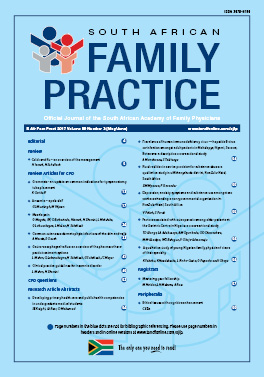Developing primary health care and public health competencies in undergraduate medical students
Keywords:
community-based curriculum, community engagement, community-oriented primary care, KwaZulu-Natal, research training
Abstract
Background: The Selective Programme (Selectives) at the University of KwaZulu-Natal (UKZN) is a three-year longitudinal, community-based programme within the undergraduate medical curriculum, which aims to develop primary health care (PHC) and public health competencies in students using the community-oriented primary care (COPC) approach. Aim: The aim of this research was to evaluate the Selectives against the Health Professions Council of South Africa (HPCSA) ‘core’ graduate competencies. Setting: This study was carried out among medical students concluding Selectives at UKZN in 2015. Methods: A cohort of 183 students concluded Selectives in 2015, and thereafter 70 (38%) completed a routine online evaluation of the programme based on the core graduate competencies. Results: Students reported substantial improvements in PHC clinical knowledge, improved understanding of a population perspective on health, and having gained public health knowledge and skills. Conclusion: Selectives is an effective way to use a decentralised PHC learning platform to enable medical students to address some of the HPCSA graduate competencies required for health care professionals and not necessarily covered by other medical disciplines. (Full text of the research articles are available online at www.medpharm.tandfonline.com/ojfp) S Afr Fam Pract 2017; DOI: 10.1080/20786190.2016.1272229
Section
Research Articles
By submitting manuscripts to SAFP, authors of original articles are assigning copyright to the South African Academy of Family Physicians. Copyright of review articles are assigned to the Publisher, Medpharm Publications (Pty) Ltd, unless otherwise specified. Authors may use their own work after publication without written permission, provided they acknowledge the original source. Individuals and academic institutions may freely copy and distribute articles published in SAFP for educational and research purposes without obtaining permission.

